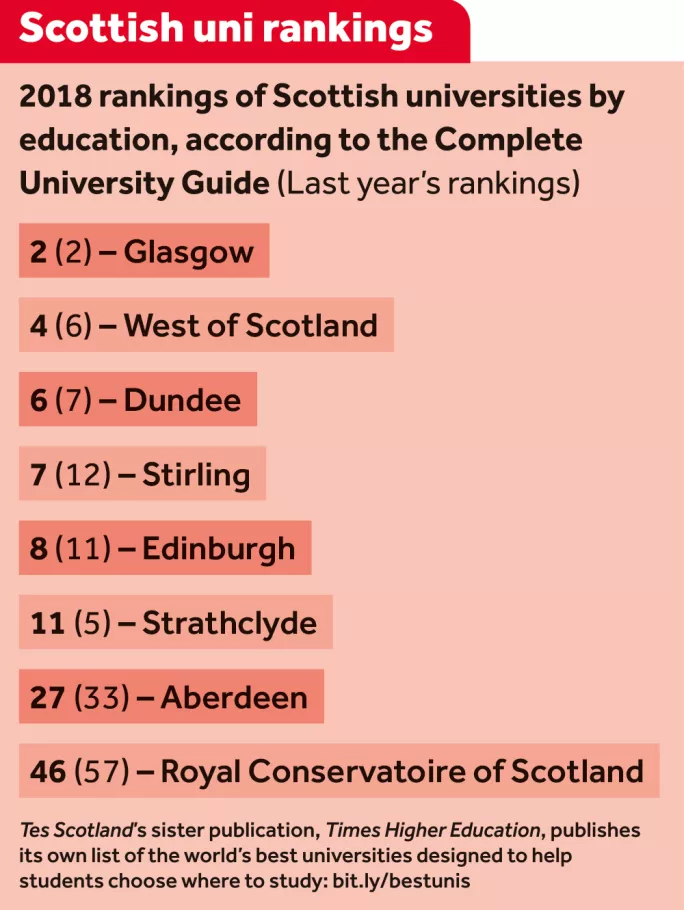Success over ‘sneering’ as university’s ranking soars

Scotland is now home to half of the UK’s top 10 schools of education, according to the latest rankings.
They include one of Scotland’s newest schools of education, which says it has had to overcome “snobbery” to be ranked fourth in the UK for education following a boost in applications from prospective student teachers.
The University of the West of Scotland - formed in August 2007 - was new to the Complete University Guide in 2012, when it was ranked 31st in the UK for education.
But it has climbed into the top five for the first time, in front of Edinburgh, Dundee and Strathclyde and outperformed only by elite Russell Group universities.
Head of the UWS School of Education, Professor Donald Gillies, told Tes Scotland: “It’s common knowledge that UWS gets sneered at by some academics and students at traditional universities - although not so much for education. I think folk know of our reputation, but there is a lot of snobbery around.”
Rising through the ranks
The university had climbed the ranks, Professor Gillies said, because the undergraduate primary teacher training course had grown in popularity, causing entry requirements to rise.
The average entry tariff score for a UWS primary undergraduate student was 291 in 2012 - equivalent to two As and two Bs at Higher levels. In 2017, it reached 425 points - equivalent to more than five As at Higher.
The university’s high student satisfaction score beat Durham, Glasgow and Cambridge.
The school of education’s weakest area, according to the guide, was “research quality”.
Professor Gillies says UWS knew it could not compete on research with the largest institutions, so prioritised learning and teaching,
UWS’s turnover was £108 million, compared with Durham (£332 million), Glasgow (£579 million) and Cambridge (£1.7 billion).
The UK’s top-ranked university education department is Durham, according to the 2018 guide, which scores undergraduate courses on entry standards, student satisfaction, research quality and graduate prospects. Glasgow is second, followed by Cambridge and UWS.
Five Scottish schools of education made it into the top 10 - two more than last year. The highest ranked was at the University of Glasgow, which the guide said offered “incredible graduate prospects”.
Stirling and Edinburgh, which ranked 12th and 11th respectively last year, moved into the top 10. However, Strathclyde dropped from fifth to 11th.
The University of Aberdeen - second for its education offering in 2008 and 2009 - is now ranked 27th, up from an all-time low last year, when its School of Education ranked 33rd.
Glasgow’s Royal Conservatoire of Scotland ranked lowest in Scotland. It made the top 10 in 2015, but is now in 46th place, having fallen to 16th in 2016 and 57th in 2017.
In two of the judging categories - entry standards and research quality - no scores were recorded for the conservatoire.
The guide’s website says the final score was “calculated using the data that was available”.
A spokeswoman for the RCS said the chart position was based on its “small and highly specialised” Bachelor of Education Music - a four-year course that allows graduates to teach music in both primary and secondary schools.
She added: “Many of our graduates go on to be leaders in music education across Scotland and beyond. The conservatoire’s BEd Music programme rates extremely highly for graduate prospects.”
A spokeswoman for the University of Aberdeen said the institution’s education provision had recently been ranked in the top 100-150 institutions on a global scale in one world university rankings, “one of only a handful of Scottish universities to achieve this status”.
She added that the university was delighted to have improved its performance in the 2018 guide and it expected this upward trend to continue as recent changes made “a positive impact in the student experience”.

You need a Tes subscription to read this article
Subscribe now to read this article and get other subscriber-only content:
- Unlimited access to all Tes magazine content
- Exclusive subscriber-only stories
- Award-winning email newsletters
Already a subscriber? Log in
You need a subscription to read this article
Subscribe now to read this article and get other subscriber-only content, including:
- Unlimited access to all Tes magazine content
- Exclusive subscriber-only stories
- Award-winning email newsletters